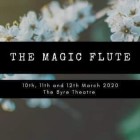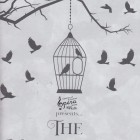Zauberflöte 2020University of St Andrews Opera Society
Read more about the opera Magic Flute
The Magic Flute is a particularly difficult work to bring off even for well-established professional companies. The casting challenges are enormous - they include finding a lovely lyric tenor and soprano for Tamino and Pamina; a cavernous bass and remarkably high soprano for the voices of good and evil; and an excellent baritone who needs to make instant contact with his audience and keep it.
Those are just a few of the problems - we also need a clutch of 'small-part' players, good chorus and a good sprinkling of talent in the orchestra pit. Also, in what can seem a long work, lots of interesting sets and costumes to keep the eye entertained.
Making our way to the lovely, intimate Byre Theatre, faced with the prospect of a performance by students, whose age seemed, by almost common agreement, to be nineteen, the feeling was largely one of anxiety. This was however tempered by memories of high standards here combined with a willingness to cheer young and enthusiastic talent.
On opening night there were plenty of rough edges from the pit band - though the essential flute was a paragon of sweetness from first to last. But most of the singing was projected just right for a small theatre. Tamino sang his portrait aria beautifully. The Three Ladies were inividually characterised, and Papageno immediately held his audience. Wonder of wonders, Alexandra Upton the attractively presented Queen of Night sang her first aria pretty much note perfect (and we have heard several worse in fully professional performances) and produced a lovely sweet tone.
Yes, this student production, with no actual music students in it, was astonishingly enjoyable. Diego Del Ser handled his dialogue beautifully as well as singing sweetly. Matthew Markham had all the notes for Sarastro, even the deepest options. His voice had a velvety soft focus. He should not really be singing this stuff for another ten years, but he had the good sense not to force things - and he also handled his dialogue convincingly. The Pamina, Amelia Poole, also showed off a beautiful sweet tone, and her great second act lament was quite exceptional.
The shorter roles were enjoyable - the priests and spirits (boys) - though some of their music was cut. The thoroughly nasty Monostatos is always a difficult sing, even for the composed tenor. Catherine Potter may therefore have struggled to project in singing, but she handled her dialogue with great accomplishment and created a consistent character.
In short, this was an evening that defied this reviewer's expectations. It is hard to imagine it not improving further at later performonces. Indeed it was noticeable that at half-time, as these players realized that what they were doing was really rather good, both their confidence and performance reached new levels.
All concerned are to be congratulated.
Performance Cast
- Tamino a Prince
- First Lady in attendance on the Queen
- Second Lady in attendance on the Queen
- Third Lady in attendance on the Queen
- Papageno a bird-catcher
- Queen of Night
- Monostatos a servant in the Temple
- Pamina daughter of the Queen of Night
- First Boy
- Second Boy
- Third Boy
- Speaker at the Temple
- Sarastro High Priest of Isis and Osiris
- First Priest
- Second Priest
- Third Priest
- Papagena disguised as an old woman
- First Armed Man
- Second Armed Man

